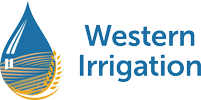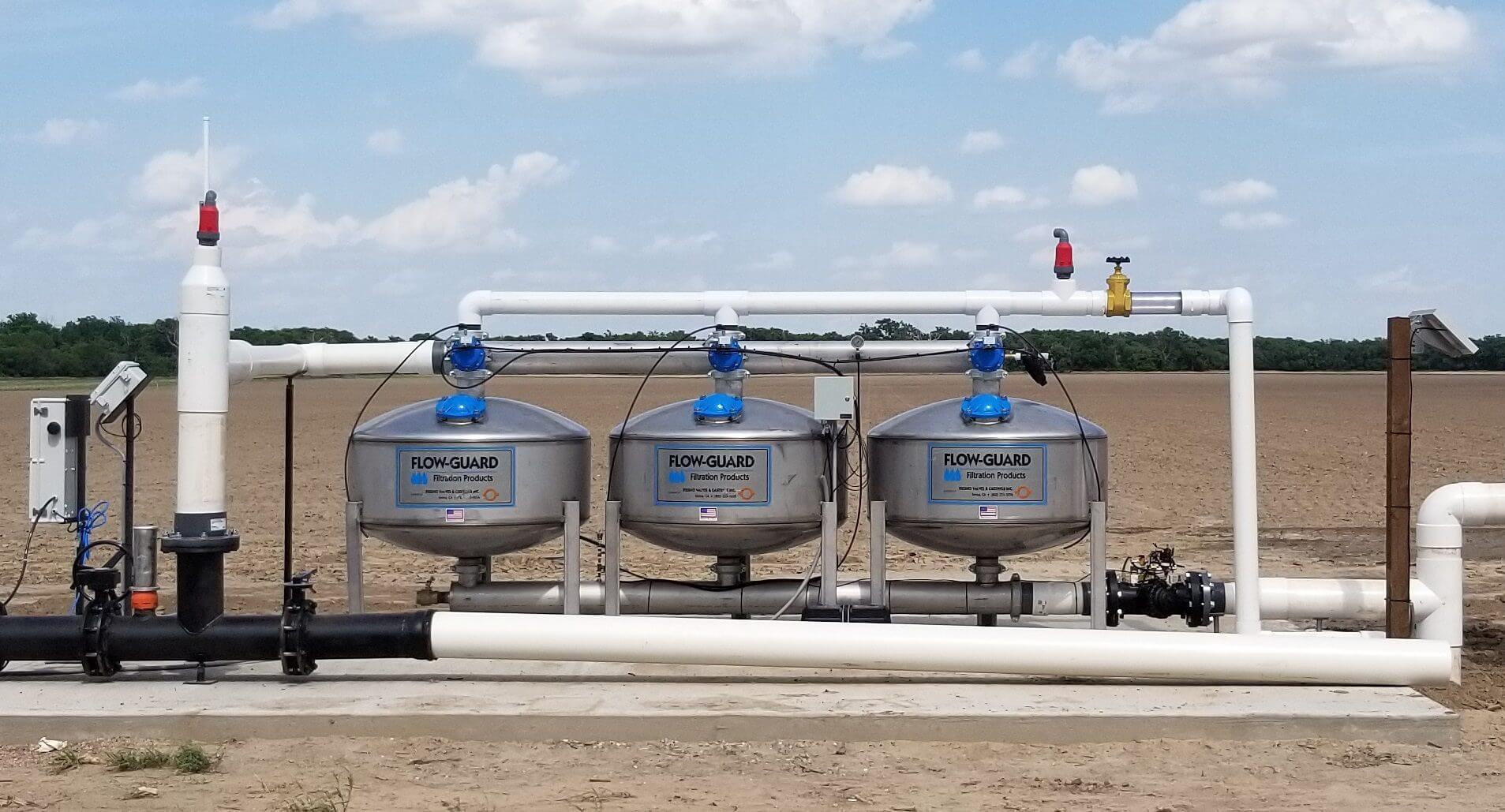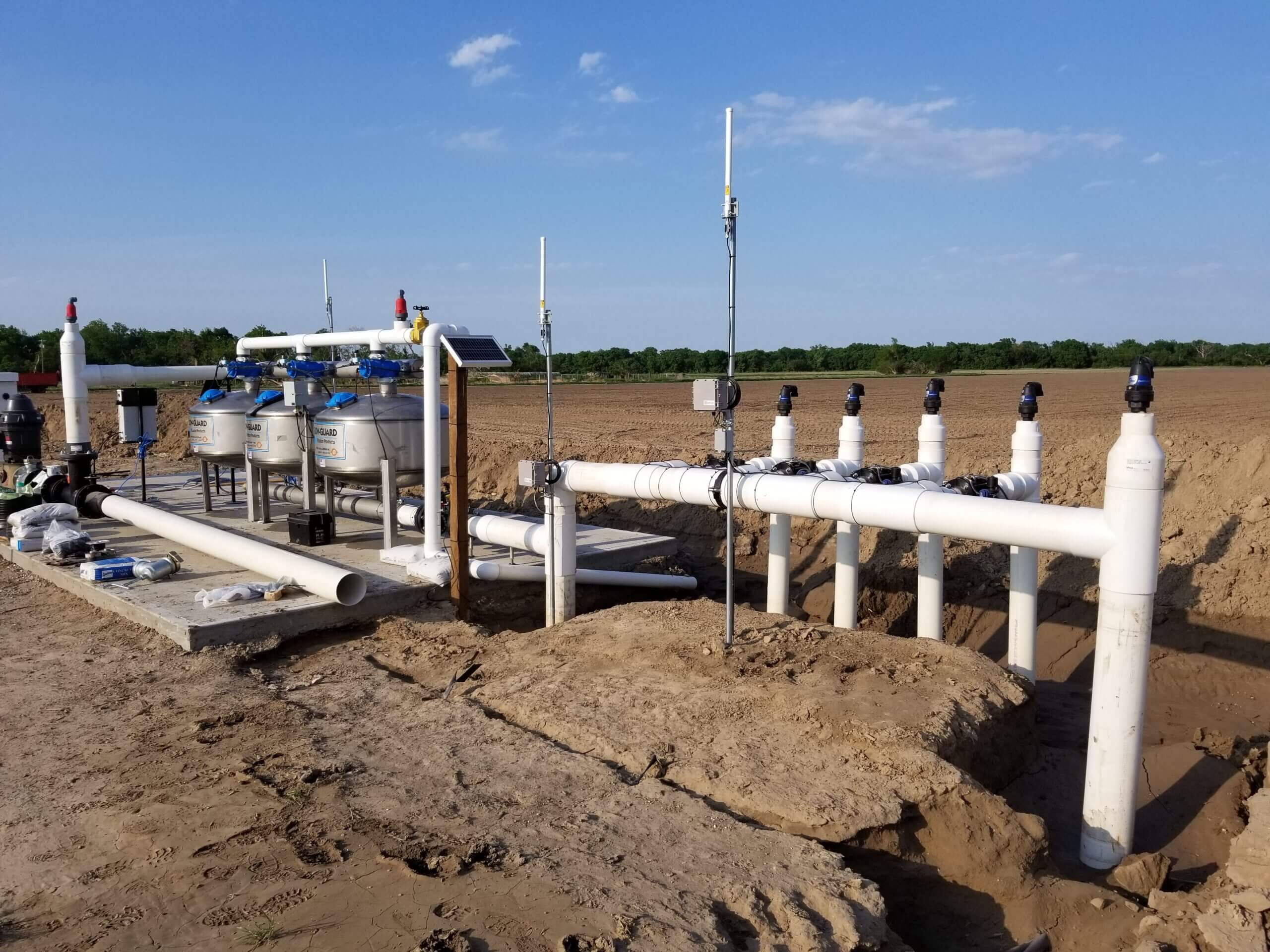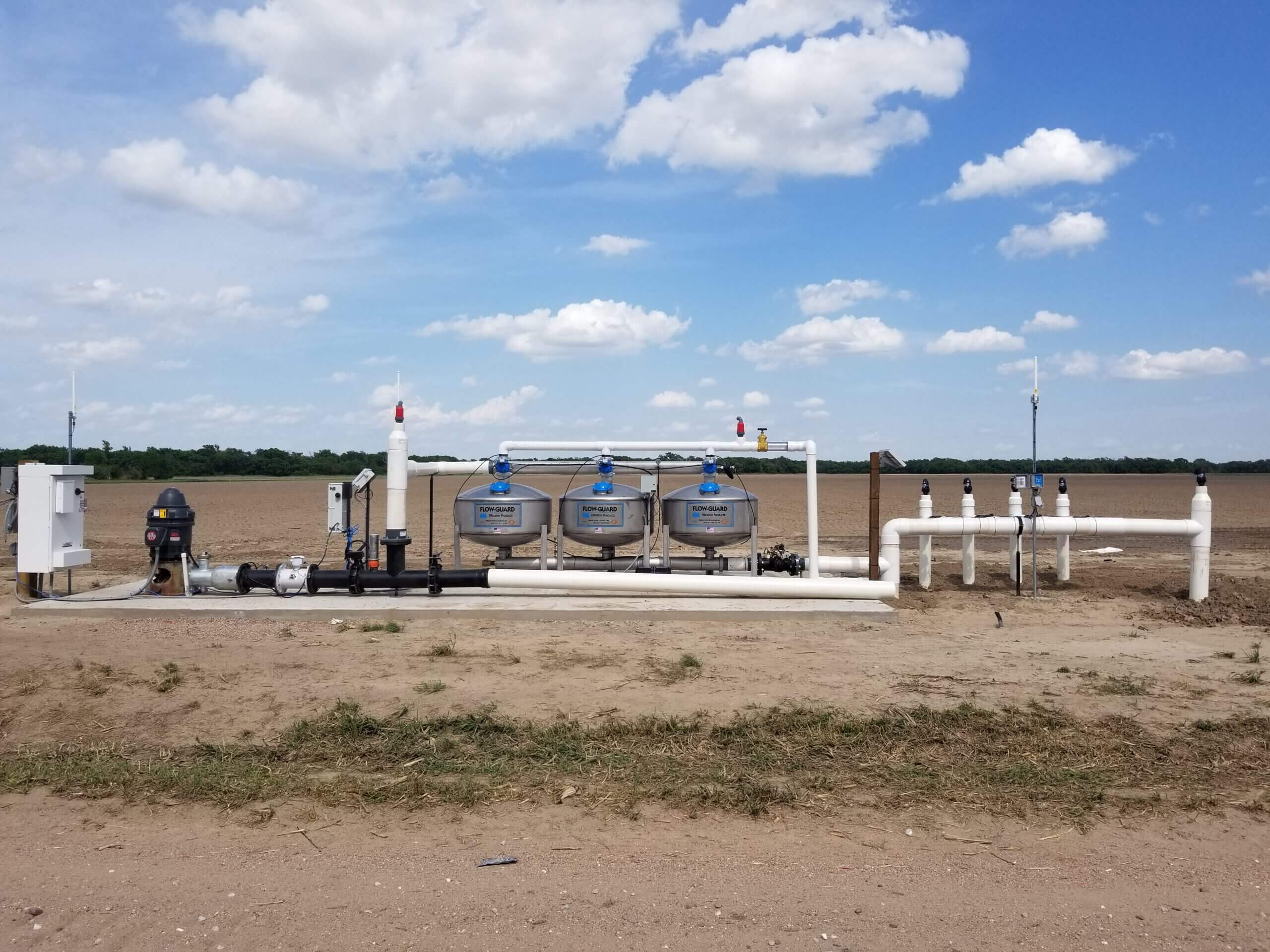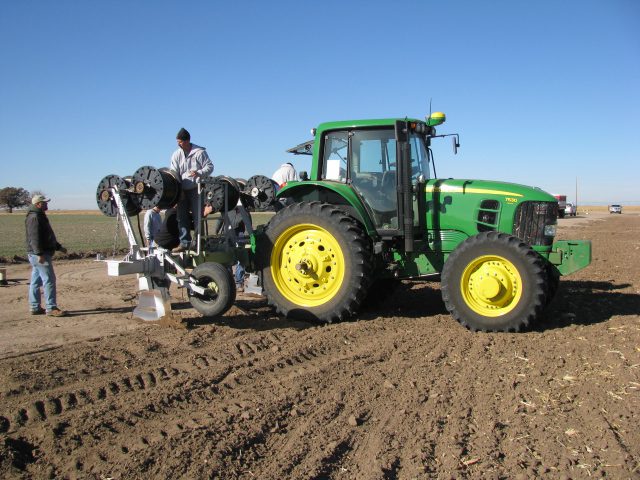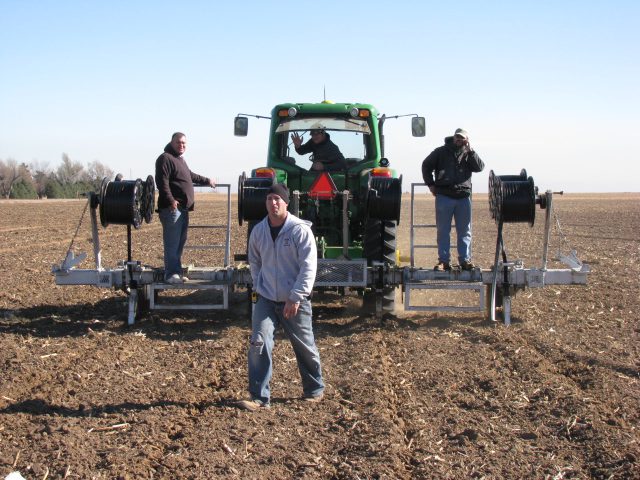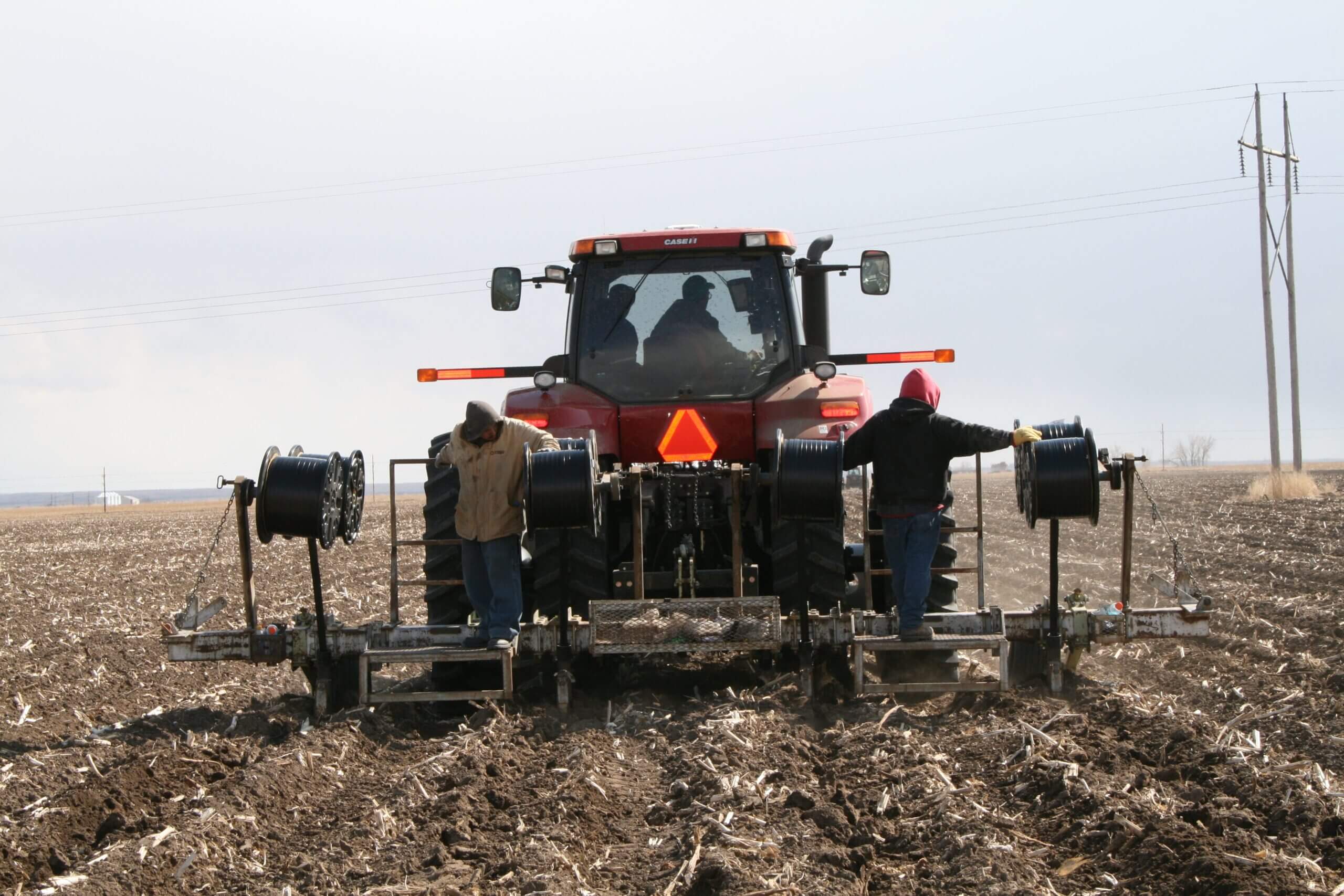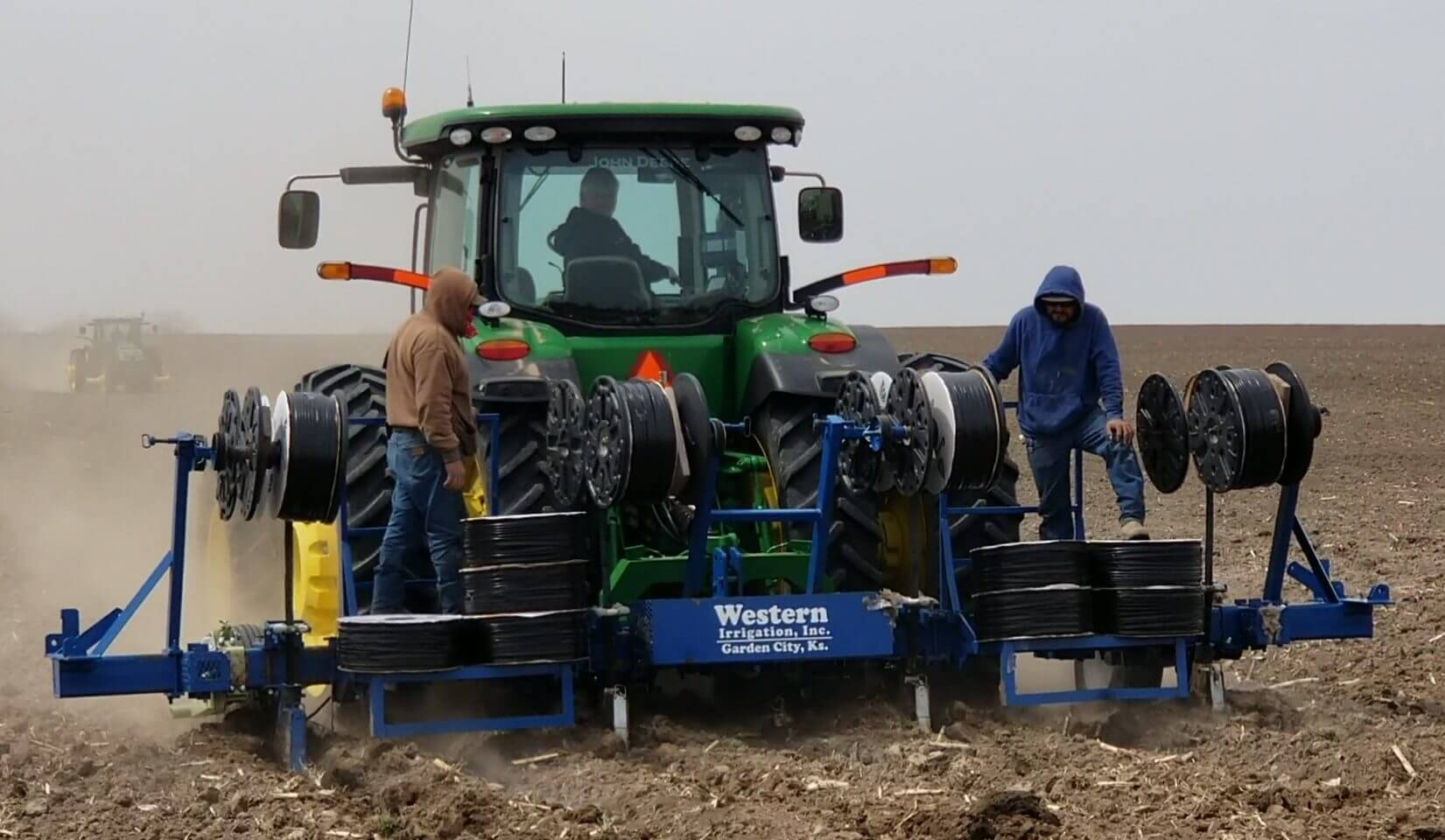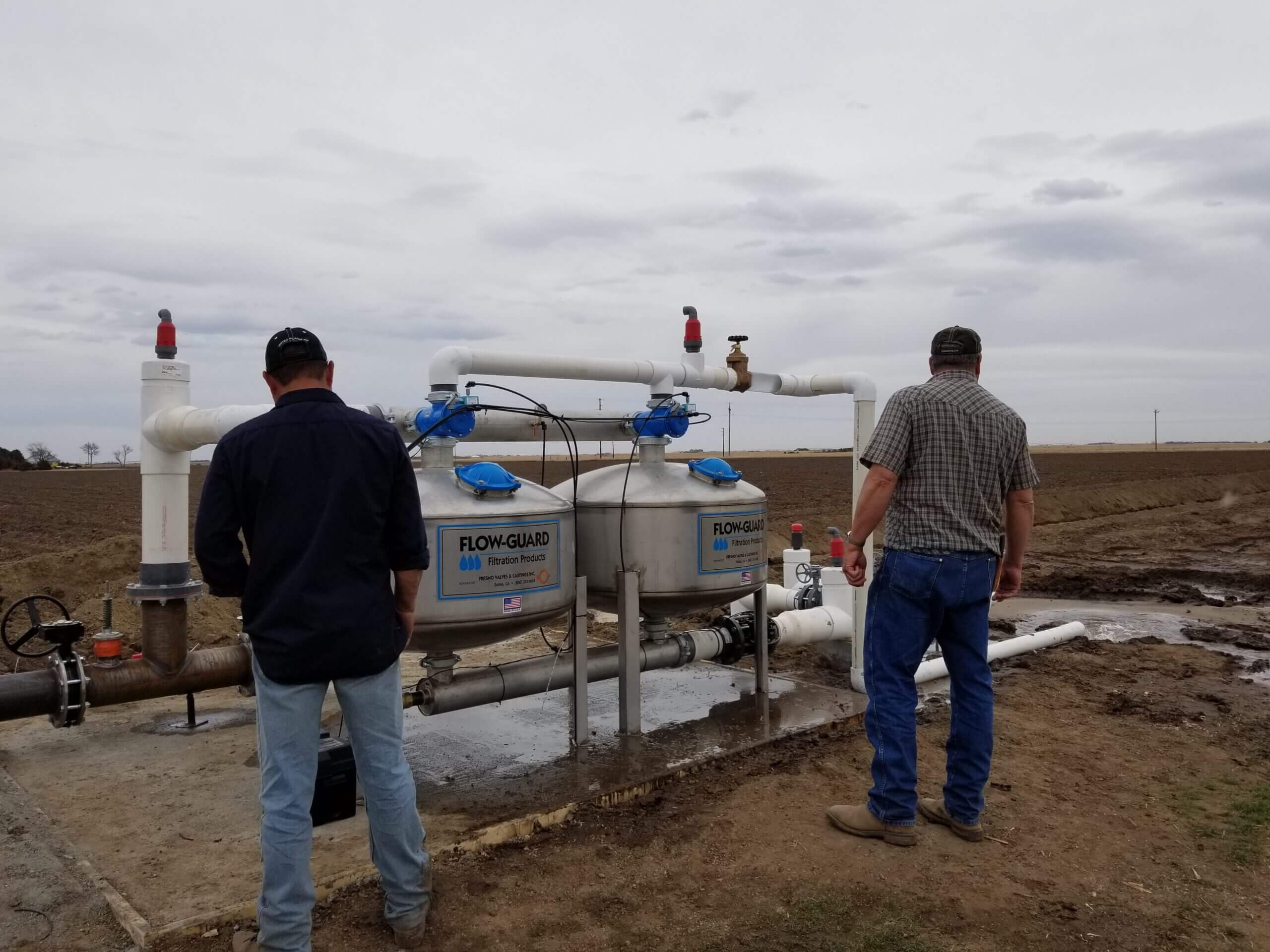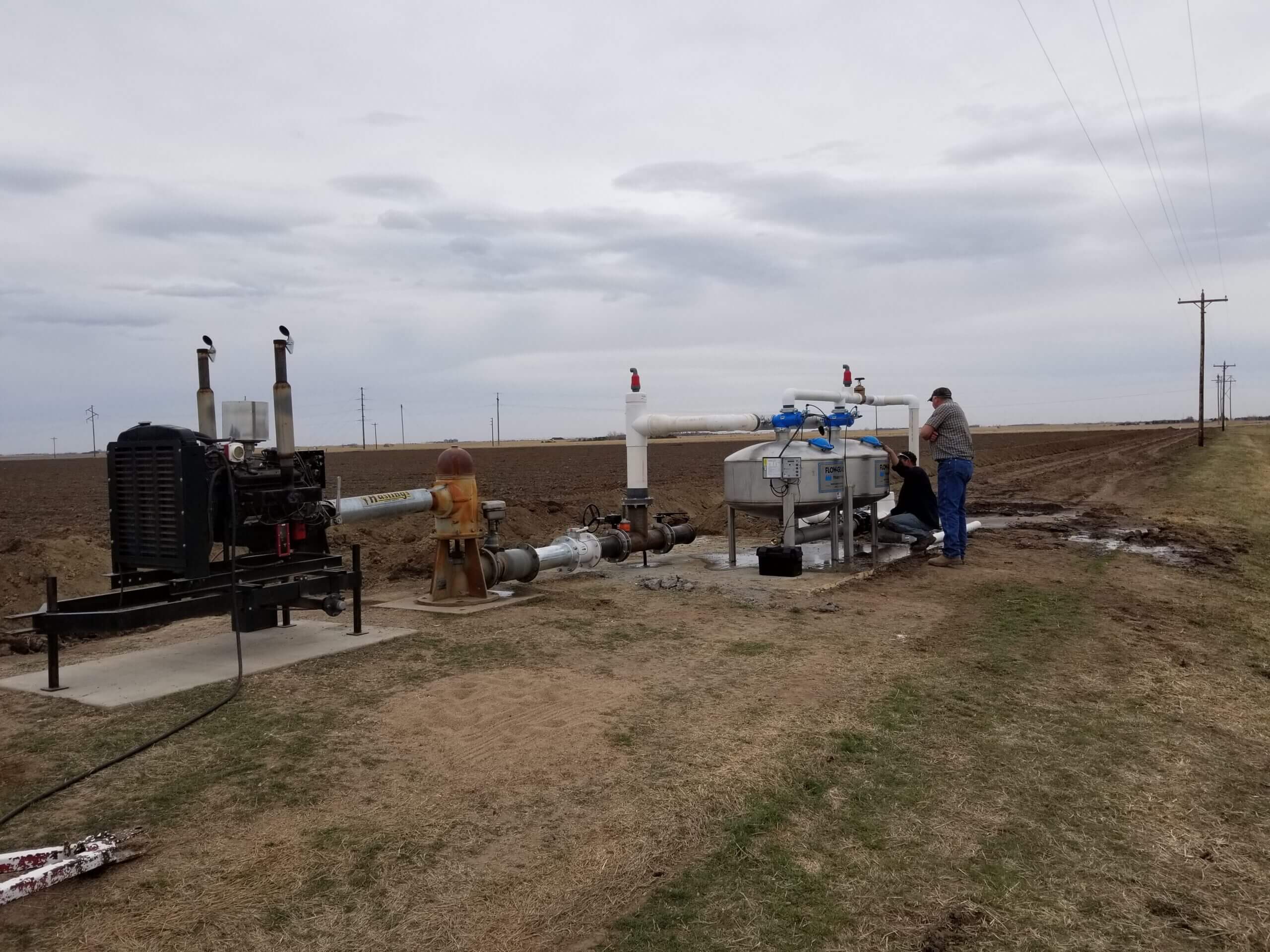Western Irrigation
WELCOME TO WESTERN IRRIGATION INC
We are a professional irrigation system sales and installation company serving middle America.
GET IN TOUCH
WHAT GROWERS ARE SAYING
GET IN TOUCH
WHAT GROWERS ARE SAYING
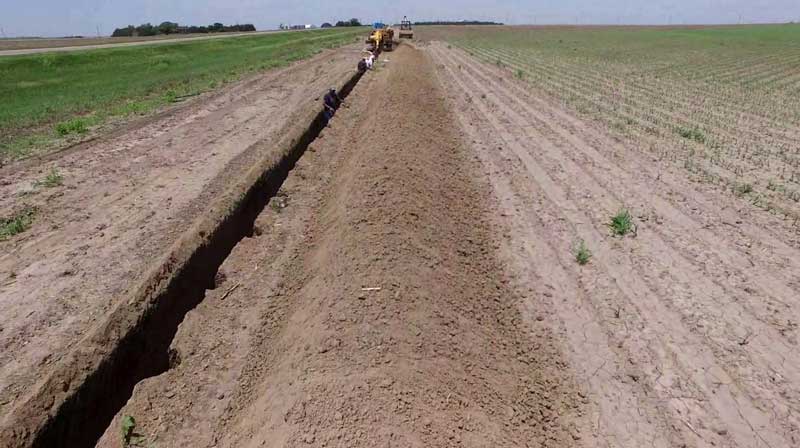
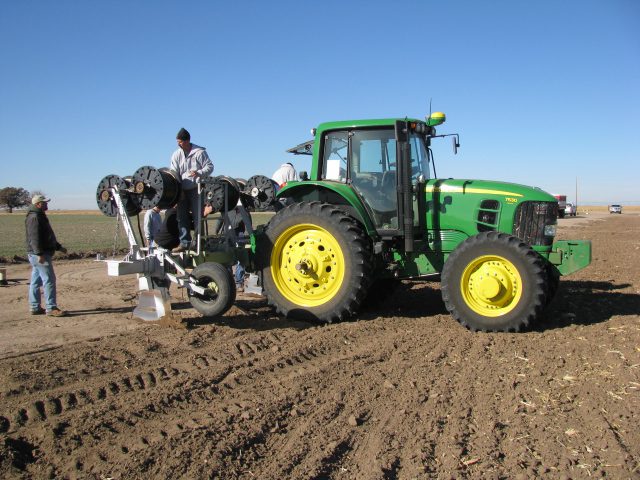
ABOUT US
If you’re looking for irrigation services near Nebraska, USA, you’ve come to the right place. Western Irrigation has a team of authorized dealers, designers, and installers who have delivered superior service and supplies since 1985. You can rely on us to integrate the latest technology, equipment, and industry knowledge at every stage of the installation process.
We set up various services for residential, commercial, and agricultural customers, from electric valves to control systems. One of our most essential and effective services is Subsurface Drip Irrigation, SDI. SDI is a low-pressure, high-efficiency system that uses drip tape to manage water crop needs. SDI results in higher yields, lower operation costs, and dramatically reduces your impact on the environment.
THE BEST IN THE MIDWEST
You’ll find everything quite systematic here! When you work with us, our expert staff will come and evaluate your property. Using GPS tracking, we’ll map out the elevation and terrain changes on your land. After that, we’ll prepare a quote based on our assessment for your approval before we get to work.
While we’re based in Garden City, KS, we perform services throughout Kansas, Nebraska, Colorado, Oklahoma, Texas, South Dakota, North Dakota, Wyoming, New Mexico, Iowa, and Missouri. We’ve even traveled all the way to Delaware. Wherever you are, that’s where we’ll be. Western Irrigation believes in creating long-lasting relationships with customers and takes every step to ensure prompt customer service. We’ll always return your call the same business day and take the time to send you an estimate within 24 hours of your request.
WHAT GROWERS ARE SAYING
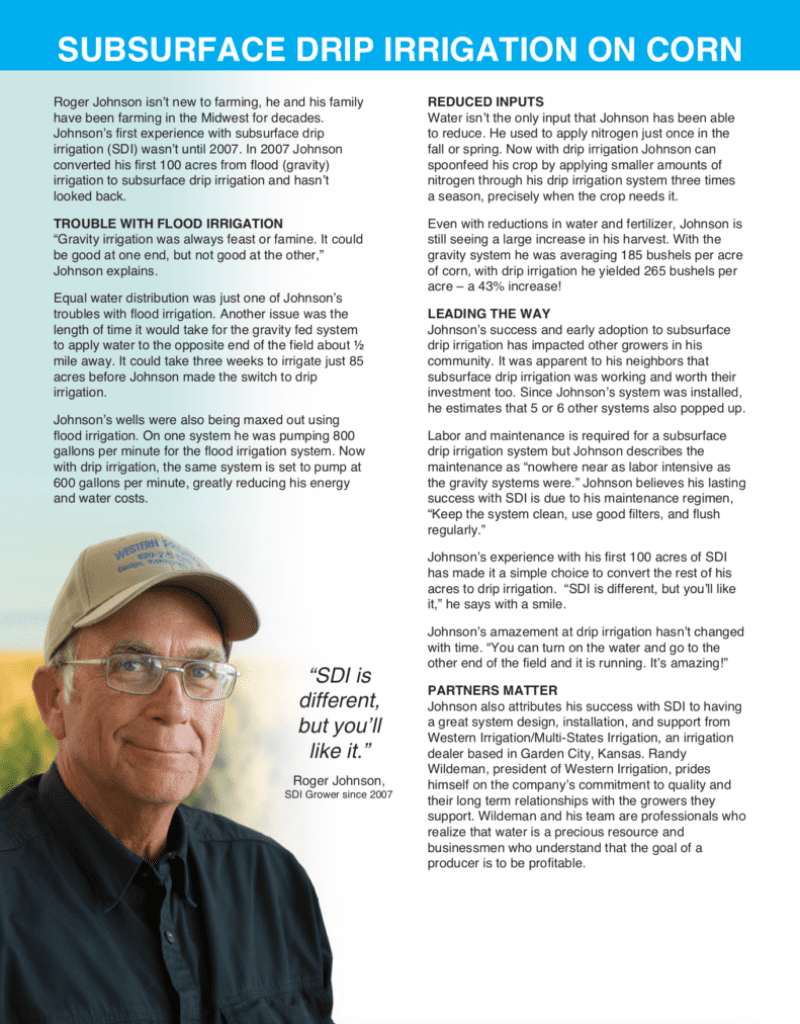
CLIENT TESTIMONIALS



FAQs
Yes, you can install a subsurface drip system yourself, but it requires a bit of planning and some manual work. A subsurface drip system, or a drip irrigation system, is a method of watering plants where the water is delivered directly to the root zone, minimizing evaporation and runoff. This system can be particularly beneficial for areas with water restrictions or for those wanting to conserve water.
Before installing a subsurface drip system, it’s important to plan out your irrigation zones based on the watering needs of your plants, the type of soil, and the landscape’s slope. You’ll also need to measure your garden or lawn to determine how much drip line you’ll need. The installation process generally involves laying down the drip line in your predetermined zones, attaching the drip line to the water source, and installing an emitter at each plant location. Keep in mind that you’ll also need to account for elements like filters to prevent clogging, pressure regulators, and a backflow preventer to protect your drinking water.
Subsurface Drip Irrigation (SDI) is a highly efficient irrigation system that uses buried drip tubes or drip tape to meet the water needs of crops. Unlike traditional irrigation methods that apply water to the soil surface, SDI delivers water directly to the root zone of the plants. This method is often utilized in agriculture due to its low-pressure and high-efficiency characteristics. It’s a form of drip irrigation that’s applied underground, providing a practical solution for various crop types as well as different topographic conditions.
The core component of an SDI system is the dripline, which includes tubing and drippers, buried beneath the soil surface. The placement of these lines varies based on the type of crop, soil type, and other factors but they are typically installed at a depth that directly targets the root zone of the plants. By delivering water and nutrients straight to the roots, SDI systems help to maximize water efficiency, reduce evaporation, and prevent weed growth. Moreover, this system allows for the precise application of water, ensuring that each plant receives the necessary hydration for healthy growth.
Agricultural water filtration is a critical process aimed at purifying water used in farming operations to ensure it’s safe and beneficial for crop irrigation. This involves removing unwanted substances such as sediments, microbes, minerals, and chemicals that could potentially harm crops or degrade soil quality. The process is vital for maintaining the health and productivity of agricultural lands, ensuring that the water used does not carry contaminants that could affect plant growth or contribute to the buildup of harmful residues in the soil.
By implementing agricultural water filtration, farmers can significantly enhance the efficiency of water usage, improve crop yield, and ensure the sustainability of their farming practices. This is especially important in areas where water sources may be compromised due to industrial runoff, municipal waste, or natural sedimentation. Through various filtration techniques, such as mechanical filters, chemical treatments, and biological processes, agricultural water filtration helps in securing a safe water supply for irrigation, contributing to the overall success and sustainability of agricultural operations.
Property size significantly impacts the cost of subsurface drip irrigation. Larger properties require more materials, such as tubing, emitters, and valves, to cover the extensive area adequately. This increase in materials leads to higher overall costs. Additionally, the labor involved in installing the system over a larger area is more intensive and time-consuming, contributing further to the expense.
On the other hand, smaller properties typically incur lower costs due to the reduced need for materials and labor. The installation process is generally quicker and less complex, which helps keep expenses down. Regardless of property size, it’s essential to have a professional assessment to ensure the system is efficiently designed to meet specific irrigation needs.
Managing irrigated corn effectively involves a combination of practices aimed at optimizing water use and ensuring healthy crop growth. One key practice is regular soil moisture monitoring, which helps determine the precise water needs of the crop. This can be achieved through soil sensors or manual checks, allowing farmers to schedule irrigation accurately and avoid both under- and over-watering. Efficient irrigation scheduling tools can aid in determining the best times to irrigate based on weather forecasts, soil conditions, and crop stages.
In addition to water management, maintaining irrigation equipment is crucial to ensure uniform water distribution and minimize system losses. Regular inspections and maintenance of pipes, pumps, and emitters can prevent leaks and blockages, enhancing the overall efficiency of the irrigation system. Implementing proper drainage systems is also essential to prevent waterlogging and soil erosion, which can negatively impact corn growth. Together, these practices contribute to higher yields, improved crop quality, and sustainable water usage in irrigated corn farming.
To ensure that your corn irrigation system is water-efficient, consider incorporating advanced irrigation technologies such as soil moisture sensors and automated control systems. These tools help tailor water application to the specific needs of your crops, minimizing water wastage and enhancing overall efficiency. Additionally, variable rate irrigation (VRI) technology can be employed to adjust water distribution according to the variability within your field, ensuring each part of the crop receives the optimal amount of water.
Another key strategy is to implement a precise irrigation scheduling plan based on factors like weather forecasts, crop growth stages, and soil moisture levels. This approach allows you to apply water only when necessary, reducing unnecessary usage and conserving resources. Regular maintenance of your irrigation system is also crucial; checking for leaks, and clogged emitters, and ensuring all components are functioning correctly can prevent water loss and maintain efficiency. By combining technology with strategic planning and maintenance, you can significantly enhance the water efficiency of your corn irrigation system.
Agricultural water management refers to the strategic planning, distribution, and monitoring of water resources in farming practices. It involves using techniques and technologies to optimize water use for irrigation, ensuring that crops receive sufficient moisture without waste. This management is crucial in regions facing water scarcity or unpredictable rainfall, allowing farmers to maintain productivity and sustain the land’s health over the long term.
The importance of agricultural water management lies in its ability to enhance crop yields and conserve water resources. By efficiently allocating water, farmers can reduce waste, lower costs, and minimize the environmental impact of excessive water usage. Moreover, effective water management supports the resilience of agricultural systems against climate change and variability, promoting sustainable farming practices that safeguard food security and the environment for future generations.
Yes, drip irrigation can be effectively used for corn cultivation. This method is highly adaptable to various soil types and climates, making it a flexible choice for farmers in diverse regions. Whether your field has sandy, loamy, or clay soil, drip systems can provide precise water delivery tailored to the specific needs of your crop. Additionally, this irrigation method is suitable for both dry and humid climates, as it allows you to control moisture levels with exceptional accuracy, ensuring optimal growing conditions for your corn.
When implementing drip irrigation for corn, farmers should consider its unique benefits and some practical factors. The system delivers water directly to the plant roots, reducing waste and promoting healthier, more robust crop development. It also allows for efficient application of fertilizers, ensuring nutrients are absorbed exactly where they’re needed. However, it’s important to plan the setup carefully to ensure proper spacing and depth of drip lines, as corn has a deep root system and wide spacing. Once established, drip irrigation can contribute to higher yields, better resource efficiency, and sustainable farming practices.
Soybean crop irrigation is the process of supplying water to soybean fields to ensure the plants receive adequate moisture for growth and development. It is often carried out through methods such as sprinklers, drip systems, or surface irrigation. Soybeans, like many crops, require consistent water supply during key growth stages, such as flowering and pod filling, to prevent stress and promote healthy plant development. Proper irrigation practices are tailored to local soil types, climate conditions, and the specific water needs of the crop.
Irrigation is important for maintaining the health of soybean crops, especially in regions where rainfall may be inconsistent or insufficient. By providing the necessary moisture levels, farmers can protect their crops from drought stress, which can significantly reduce yields. Additionally, efficient irrigation helps optimize water use, preventing overwatering and conserving this valuable resource. A well-managed irrigation system plays a critical role in maximizing yield potential and ensuring high-quality soybean production, supporting both economic and environmental sustainability.
Corn irrigation is the process of providing water to corn crops to meet their moisture needs throughout the growing season. This is typically done using methods such as pivot sprinklers, drip irrigation, or surface water systems. Corn requires precise amounts of water during certain stages, like germination, tasseling, and kernel development, to ensure optimal growth. By supplying the right amount of water at the right time, irrigation helps prevent stress on the plants and promotes healthy development.
Irrigation is essential for maintaining strong corn yields, especially in areas where rainfall is unreliable or insufficient. Consistent water availability supports the plant’s ability to produce large, healthy ears of corn. Equally important, effective irrigation practices help optimize how water is used, reducing waste and protecting environmental resources. By using irrigation systems efficiently, farmers can maximize crop yield and quality while conserving water for long-term sustainability.
Corner to corner irrigation is a system designed to ensure thorough and even watering coverage across an entire area, such as a field, garden, or lawn. This method aims to eliminate dry patches or inconsistencies by positioning irrigation equipment to reach every corner of the space. Typically, sprinklers, drip systems, or other irrigation tools are strategically placed and adjusted to achieve uniform distribution, maximizing water efficiency and promoting healthy plant growth.
One of the key advantages of corner to corner irrigation is its ability to optimize water usage while maintaining consistent moisture levels in the soil. By carefully planning the system layout and flow rates, you can avoid overwatering certain areas or leaving others too dry. This precision not only benefits plants but also helps reduce water waste, making it an environmentally-friendly choice for irrigation. Whether used in agriculture or residential landscapes, this method provides an effective solution for maintaining lush, well-watered spaces.
Installing subsurface drip irrigation offers significant advantages for efficiently managing water usage in both agricultural and residential settings. This system delivers water directly to the root zone of plants through a network of buried drip lines, ensuring that water is applied exactly where it’s needed. This minimizes evaporation and runoff, making it a highly water-efficient option compared to traditional irrigation methods. By keeping the soil consistently moist, subsurface drip irrigation promotes healthier plant growth and reduces the risk of water waste.
Another benefit of installing subsurface drip irrigation is the convenience and labor savings it provides. Once installed, the system requires little maintenance and reduces the need for manual watering. It also helps prevent weed growth since the surface soil remains dry, which inhibits weed seeds from germinating. Additionally, by limiting water contact with foliage, this system helps reduce the spread of plant diseases caused by excessive moisture. For anyone seeking an eco-friendly and effective irrigation solution, subsurface drip irrigation is worth considering.
One common challenge with soybean irrigation is ensuring the correct amount of water is applied. Too much water can lead to waterlogging, which deprives the roots of oxygen and stunts plant growth. On the other hand, insufficient irrigation can cause stress during critical growth stages, reducing yield. Striking the right balance often depends on factors like soil type, weather conditions, and the crop’s specific growth phase.
Another issue is uniform water distribution across the field. Uneven irrigation can result in some areas being overwatered while others remain dry, potentially creating inconsistent crop development. Additionally, managing irrigation efficiently to conserve water while meeting crop needs can be tricky, especially during drought conditions or with limited water supplies. Proper planning and monitoring can help overcome these difficulties and improve overall effectiveness.
Several factors influence the amount of water required for soybean crop irrigation per day, starting with weather conditions. Hot, dry, or windy days can increase evaporation and water loss, leading to a higher demand for irrigation. Conversely, cooler climates or days with consistent rainfall can reduce the amount of supplemental water needed. Soil type is another critical factor, as sandy soils drain water quickly and may require more frequent irrigation, while clay or loamy soils retain moisture longer, reducing the need for frequent watering.
The growth stage of the soybean crop also plays a major role in determining daily water needs. During key stages like flowering and pod development, soybeans require more water to support healthy growth and maximize yield. Additionally, the irrigation method used, whether it’s drip irrigation, sprinkler systems, or furrow irrigation, can affect water distribution efficiency and overall crop hydration. Considering these factors ensures accurate and efficient soybean crop irrigation per day, promoting healthy crops and optimal harvests.
Drip irrigation for corn works by delivering water and nutrients directly to the root zone of each plant through a network of tubes or tapes. These drip lines are typically installed on the surface of the soil or buried a few inches deep, running parallel to the rows of corn. Small emitters are spaced along the lines, designed to release water slowly and precisely. This method ensures that the water is applied exactly where it’s needed most, minimizing loss from evaporation or runoff. By maintaining consistent moisture levels in the soil, the system prevents water stress on the plants, which is crucial during key growth stages.
This precise application of water leads to several significant benefits for a corn crop. Because water is delivered directly to the roots, it promotes deeper root growth and stronger plant development. It also allows for a practice called fertigation, where fertilizers are mixed into the irrigation water and delivered just as efficiently, improving nutrient uptake. This targeted approach not only conserves water compared to traditional overhead sprinkler systems but can also lead to more uniform crop growth and higher yields.
Rivulis T-Tape is a widely used type of drip tape designed for precision irrigation in agricultural settings. It consists of a flat, flexible tube that is placed along crop rows, either on the soil surface, under a layer of mulch, or shallowly buried underground. Along the tape, there are carefully engineered emitters or outlets spaced at specific intervals. When water flows through the system, these emitters deliver it slowly and uniformly directly to the base of each plant, targeting the root zone. The primary purpose of this design is to apply water precisely where it is most beneficial for crop growth.
The use of Rivulis T-Tape offers several significant advantages for growers. Its main benefit is superior water efficiency, as it dramatically reduces water loss from evaporation and runoff commonly seen with overhead sprinkler systems. This direct-to-the-root watering method also helps suppress weed growth between rows and can lower the risk of foliar diseases by keeping the leaves dry. The consistent water distribution provided by the system promotes more uniform crop development, which can lead to improved yields and quality. Its durable construction and resistance to clogging make it a reliable and effective solution for irrigating a diverse range of crops.
Irrigation of corn refers to the practice of artificially applying water to cornfields to supplement natural rainfall. This process is essential because corn has significant water needs, especially during critical growth periods like pollination and kernel development. Relying solely on rain can be unpredictable and risky, potentially leading to water stress that can stunt growth and drastically reduce the final harvest. By using irrigation, farmers can provide a consistent and controlled water supply, which helps mitigate the effects of drought and ensures the crop reaches its full yield potential.
Farmers employ several methods to irrigate their cornfields, depending on factors like field size, water availability, and the local climate. One of the most common systems is center-pivot irrigation, which uses a long, wheeled pipeline that rotates around a central point, watering a large circular area. Another highly efficient technique is drip irrigation, where water is delivered directly to the base of each plant through a network of tubes, minimizing loss from evaporation. A more traditional approach is furrow irrigation, which involves channeling water to flow through small trenches created between the rows of corn.
Rivulis T Tape is widely recognized for its durability and is engineered to perform reliably in demanding agricultural environments. Constructed from high-quality polyethylene, it is designed to resist punctures, tears, and stretching during both installation and retrieval. This robust build quality ensures that the tape can withstand the typical friction and tension it encounters in the field. Its physical resilience is a key factor in preventing leaks and maintaining uniform water distribution across the entire length of the irrigation lines, making it a dependable choice for growers.
The longevity of Rivulis T Tape is further enhanced by its sophisticated emitter technology, which is specifically designed to prevent clogging. Each emitter features a unique flow path that creates turbulence, effectively scouring the channel to keep sediment from settling and causing blockages. This self-cleaning action ensures consistent performance over time. The tape’s material is also formulated to resist degradation from UV sunlight and common agricultural chemicals. While the ultimate lifespan depends on factors like water quality, field conditions, and proper maintenance, it is built to provide consistent service for one or more growing seasons.
Agriculture and water management refer to the systematic planning, development, distribution, and optimization of water resources for farming purposes. Since agriculture is the single largest user of freshwater globally, effective management is crucial for growing food sustainably while conserving this vital resource. This practice involves understanding crop water needs, monitoring soil moisture levels, and implementing strategies to ensure that plants receive the right amount of water at the right time without waste. It balances the need for high crop yields with the necessity of preserving local watersheds and ecosystems.
To achieve this balance, farmers and agronomists use various methods to control how water is applied to fields. Traditional methods like flood irrigation are increasingly being replaced or supplemented by more efficient technologies such as drip irrigation and sprinkler systems, which deliver water directly to the plant roots. Beyond just irrigation, water management also includes drainage strategies to prevent waterlogging, rainwater harvesting to capture natural precipitation, and the use of soil conservation techniques like mulching to retain moisture. By managing water effectively, producers can improve crop quality, reduce costs, and protect the environment against issues like soil erosion and salinity.
Subsurface drip systems are an advanced method of irrigation where water is delivered directly to the root zone of plants through buried tubes or tapes. Unlike traditional sprinkler systems that spray water into the air, this network of flexible piping is installed below the soil surface, typically anywhere from a few inches to over a foot deep. The tubing contains built-in emitters spaced at regular intervals, which slowly release water directly into the soil. This allows moisture to spread through capillary action, hydrating the roots efficiently without wetting the surface or the plant foliage.
The primary benefit of this system is its exceptional water efficiency. By delivering water underground, subsurface drip irrigation significantly reduces evaporation and prevents runoff, ensuring that nearly every drop is used by the plants. This targeted approach minimizes weed growth since the soil surface remains dry, and it also lowers the risk of fungal diseases that thrive on wet leaves. Additionally, because the equipment is hidden beneath the ground, it eliminates the unsightly clutter of hoses or sprinkler heads, making it an aesthetically pleasing and durable solution for lawns, gardens, and agricultural fields.
Sub surface drip irrigation (SDI) is a highly efficient watering method that delivers moisture directly to the root zone of plants through a network of buried tubes or tapes. Instead of spraying water through the air like conventional sprinklers, this system uses flexible piping installed below the ground’s surface. These tubes feature small, precision emitters that slowly release water into the surrounding soil. As the water seeps out, it spreads horizontally and vertically through capillary action, ensuring that the roots receive consistent hydration without ever wetting the soil surface or the plant leaves.
This approach offers significant advantages for both water conservation and plant health. Because the water is applied underground, evaporation is virtually eliminated, and there is no loss due to wind drift or surface runoff. This makes SDI one of the most water-efficient irrigation technologies available. Furthermore, keeping the surface soil dry discourages weed germination and reduces the humidity around the plant foliage, which helps prevent common fungal diseases and rot. The system is versatile and can be used for everything from residential lawns and gardens to large-scale agricultural crops, providing a durable and invisible solution for landscape maintenance.
